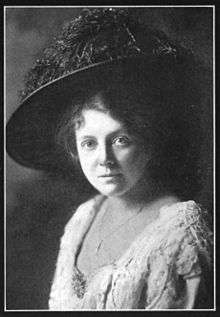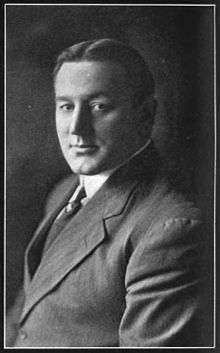Blanche Deyo
Blanche Lillian Deyo (née Pixley, c.1880 – August 29, 1933)[1] was an American Broadway actress and vaudeville dancer of the early 20th century.[2]
Blanche Lillian Deyo | |
|---|---|
 | |
| Born | Blanche Lillian Pixley circa 1880 |
| Died | August 30, 1933 |
| Occupation | Actress and Dancer |
Family
Deyo's mother was Lillian Scott and her sister was Grace Scott Giffen.[1] Her father was Robert F. Pixley, a mining engineer, who died in Los Angeles, California in February 1908.[3]
Stage career
Deyo appeared as Miss Carruthers in A Country Girl, September–December 1902.
She also appeared as Peggy Sabine in the musical play The Cingalee at Daly's Theatre on Broadway, in October 1904. The musical featured chorus girls with extravagant costumes and splendorous settings with oriental motifs.[4] After appearing as Ozma in The Woggle-Bug (1905), she was signed by Frank L. Perley (agent to Mabel Hite, who also appeared in the show) for a part in The Winning Girl.[5] The play was staged at the Shubert Park Theatre in Brooklyn, New York.[6] Deyo was in a company that presented Mexicana at the Lyric Theatre (New York) in February 1906. The show was produced by Sam S. Shubert.[7] In April she participated in a benefit for victims of the 1906 San Francisco earthquake at the Casino Theatre.[8]
Blanche Ring was the leading lady of The Merry Widow and the Devil which played the Grand Opera House,[9] 23rd Street (Manhattan) (8th Avenue (Manhattan),[10] in November 1908.[9] It was staged by Julian Mitchell with music by Franz Lehár. Deyo was in a cast which included Grace Griswold and Joe Weber.
Deyo and comedian Franker Woods toured in The Echo in 1911 after the play had a successful run at the Lunt-Fontanne Theatre (Globe Theatre). The season prior to this she appeared as Paulette Devine in The Blue Mouse.[11]
Theatrical manager Edwin A. Weil owed Deyo $1,692 when he filed for bankruptcy in November 1913.[12]
Deyo was among the actors in All Over Town, the last theatrical production of the 1914-1915 season in Washington, D.C. staged at the Belasco Theatre, when she teamed with Roy Atwell in a "diamond robbery motion picture specialty" in the opening act. Her Charlie Chaplin number, performed with eight members of the chorus, earned her the most applause.[13]
Private life
She married tramp impersonator Walter Newton Jones in Crown Point, Indiana in April 1908.[14] It was her second marriage.[2] Jones and Deyo had a daughter in December 1913. She was named Blanche Deyo.[15]
Her hobby was collecting dancing slippers. She began her collection by accident when she obtained a pair owned by Marie Taglion. Deyo filled two glass display cases with slippers worn by famous dancers in her Philadelphia, Pennsylvania home.[16]
Death
Blanche Deyo Jones died on August 29, 1933.[1]
References
- "Blanche Deyo". The New York Times. August 30, 1933.
- Walter Jones Marries Again, The New York Times, April 8, 1908, pg. 7.
- Obituary, Los Angeles Times, February 27, 1908, pg. I5.
- "The Cingalee Heard At Daly's Last Night", The New York Times, October 25, 1904, pg. 9.
- "Theatrical Notes", The New York Times, September 14, 1905, pg. 9.
- "This Week's Offerings", The New York Times, November 26, 1905, pg. X3.
- "Theatrical Notes'", The New York Times, January 13, 1906, pg. 9.
- "San Francsico Benefits", The New York Times, April 29, 1906, pg. X7.
- Brooklyn Amusements, The New York Times, November 22, 1908, pg. X7.
- Grand Opera House, Internet Broadway Database, Retrieved 1-9-08.
- "Blanche Deyo in The Echo", San Antonio Express, November 5, 1911, pg. 32.
- "Business Troubles", The New York Times, November 29, 1913, pg. 20.
- "All Over Town A Hit", The Washington Post, April 29, 1915, pg. 5.
- "Walter Jones Weds Again". Chicago Tribune. April 7, 1908.
- "Theatrical Notes", The New York Times, December 17, 1913, pg. 11.
- "Amusements", Waterloo, Iowa Evening Courier, May 16, 1910, pg. 6.
External links
| Wikimedia Commons has media related to Blanche Deyo. |
